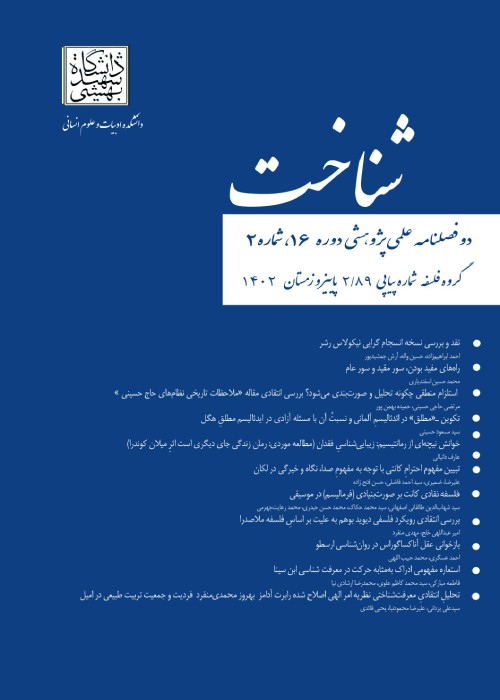The Distinction between Vernunft and Weisheit in Nietzsche's Thus Spoke Zarathustra
Author(s):
Abstract:
There is a clear distinction between “Vernunft” (“reason”) and “Weisheit” (“wisdom) in the German language and their equivalents in other European languages. But this distinction disappears when in the Persian translation of Nietzsche’s Thus Spoke Zarathustra in which the translator uses an equivocal term to translate these terms: “kherad”. In Persian, “kherad” means both “reason” and “wisdom”. Darius Ashuri, the distinguished translator of Nietzsche’s books, sometimes translates “Vernunft” into “Aql” (“reason”) and sometimes into “kherad” (“wisdom”). He also translates “Weisheit” into “kherad” and uses many synonyms for it, among them, “farzaanehgi”, “hekmat”, and “kheradmandi”. These equivalents and synonyms create gross confusion about the concepts of “reason” and “wisdom” in Nietzsches’ work. In 1382/2003, Noshin Shahande published a book entiteled Woman in Nietzsche’s Thought. In chapter 3 with the title of “The Woman-Praise in Nietzsche”, she suggests that there is an identity between “woman” and “wisdom” in Nietzsche’s thought when he says, “Brave, Unconcerned, mocking, violent — thus wisdom (kherad) wants us: she is a woman and always loves only a warrior.” Then, she cites several statements in which Nietzsche says, “There is always some madness in love. But there is also always some reason (kherad) in madness.”; “The body is a great reason (kherad), a pularity with one sense, a war and a peace, a herd and a shepherd.”; and “Your little reason (kherad), my brother, which you call “spirit” — a little instrument and toy of your great reason (kherad).” Misled by the incorrect translation, she concludes that the identity of “woman” and “wisdom” in Nietzsche’s work. In this paper, I try to following the rules of text studies in biblical scholarship, “lower criticism” and “higher criticism”. Therfore, at first, I attempt to cast a light an Nietzsche’s text to find all of what he says about “reason” and “wisdom”. Then, I try to make a possible interpretation of Nietzsche’s words about the “woman” as a metaphor for “wisdom”.
Language:
Persian
Published:
Journal of Recognition, Volume:3 Issue: 1, 2010
Page:
7
magiran.com/p964409
دانلود و مطالعه متن این مقاله با یکی از روشهای زیر امکان پذیر است:
اشتراک شخصی
با عضویت و پرداخت آنلاین حق اشتراک یکساله به مبلغ 1,390,000ريال میتوانید 70 عنوان مطلب دانلود کنید!
اشتراک سازمانی
به کتابخانه دانشگاه یا محل کار خود پیشنهاد کنید تا اشتراک سازمانی این پایگاه را برای دسترسی نامحدود همه کاربران به متن مطالب تهیه نمایند!
توجه!
- حق عضویت دریافتی صرف حمایت از نشریات عضو و نگهداری، تکمیل و توسعه مگیران میشود.
- پرداخت حق اشتراک و دانلود مقالات اجازه بازنشر آن در سایر رسانههای چاپی و دیجیتال را به کاربر نمیدهد.
In order to view content subscription is required
Personal subscription
Subscribe magiran.com for 70 € euros via PayPal and download 70 articles during a year.
Organization subscription
Please contact us to subscribe your university or library for unlimited access!


